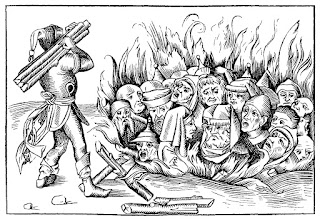Seville, 1391
Seville, Spain
6 June, 1391
Archdeacon Ferrand Martinez took advantage of an unstable political situation to raise a mob of Christians against the Jews of Seville in the year 1391. Although the local authorities ordered the public whipping of two of the leaders of the mob, this only further provoked the populace.
On June 6, the mob attacked the Jewish quarter, calling out "death to the Jews." True to their word, they proceeded to kill 4,000 Jews. The mob rushed the Jewish quarter simultaneously from both gates, trapping the people inside. Some were killed at home, others in the three synagogues. The survivors only escaped by agreeing to be baptized. (Jewish Encyclopedia)
6 June, 1391
Archdeacon Ferrand Martinez took advantage of an unstable political situation to raise a mob of Christians against the Jews of Seville in the year 1391. Although the local authorities ordered the public whipping of two of the leaders of the mob, this only further provoked the populace.
On June 6, the mob attacked the Jewish quarter, calling out "death to the Jews." True to their word, they proceeded to kill 4,000 Jews. The mob rushed the Jewish quarter simultaneously from both gates, trapping the people inside. Some were killed at home, others in the three synagogues. The survivors only escaped by agreeing to be baptized. (Jewish Encyclopedia)
"Men, women and children had their throats slit without mercy, in their own homes and in the synagogues. The massacres lasted an entire day and cost the lives of a huge number of people, 4000 souls." (oocities.org, referencingModesto Lafuente's History of Spain and Joaquin Guichot's History of the City of Seville)As the killing progressed, Martinez continued to push the mob forward:
"Amidst the yells of the savage mob and and the groans of the dying, was heard the voice of the archdeacon, encouraging them in those horrible scenes of carnage and extermination." (Eliam Hiam Lindo, The History of the Jews of Spain and Portugal, 173)Several Kinot were penned that recall the events in Seville, though one, Yehuda ve-Yisrael De'u Mar Li Me'od, was censored to exclude explicit referenced to the city. Another Kinah was called Nishmat Kol Chai.


Comments
Post a Comment